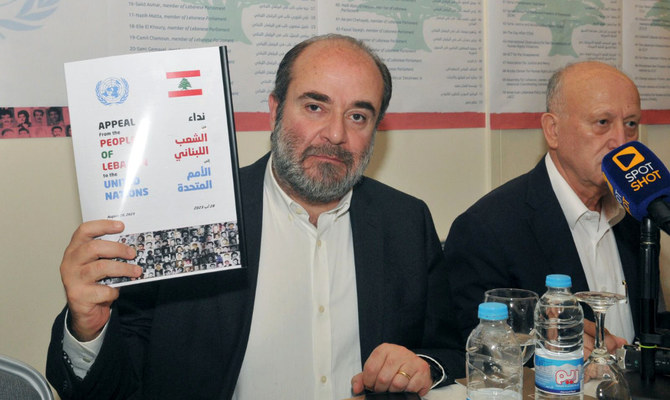
- ARAB NEWS
- 03 Jul 2025

BEIRUT: Several associations and 46 MPs in Lebanon have called for the Lebanese missing in Syrian prisons to be included in the remit of a UN-created body that seeks to establish the fate of people who have been forcibly disappeared during Syria’s civil war.
The UN General Assembly has already approved the creation of the Independent Institution on Missing Persons in Syria.
MPs from different parties and political forces signed a petition addressed to UN Secretary-General Antonio Guterres seeking clarity on the fate of the missing and forcibly disappeared people in Syria.
“There’s an international right called the right to know the fate of the detained or forcibly disappeared people, and the Syrian regime is still denying that right,” said MP Georges Okais, speaking at a press conference on Monday organized by the MPs who signed the petition.
He said that many commissions set up in Lebanon tried to look into their fate at the hands of the Syrian regime, but those attempts failed.
MPs from the Kataeb party, the Strong Republic bloc, the Democratic Gathering bloc, and the Renewal Movement, as well as independent MPs, signed the petition, which is to be submitted to the Office of the UN High Commissioner for Human Rights in Beirut.
Ali Abou Dehen, head of the Association of Lebanese Detainees in Syrian Prisons, estimates the number of Lebanese missing in these prisons at 622.
He affirmed that the detainees “are alive until the Syrian state proves their death and delivers them either alive or dead.”
Abou Dehen had spent 13 years in Syrian prisons, mostly in the Tadmor prison located in the deserts of eastern Syria, during the country’s occupation of Lebanon. He was released in 2000.
He published a book on his experience titled “Back from Hell” in 2011.
The case of the missing and forcibly disappeared people in Lebanon and Syria has not been settled despite the end of the civil war 33 years ago and the withdrawal of the Syrian troops from Lebanon 18 years ago.
Families of the missing and detained have been carrying out street protests for decades, with some of them passing away without knowing the fate of their children.
According to UN estimates, the number of missing people in Syria since 2011 has exceeded 100,000, in addition to those who have been missing since before that date.
Syrian authorities released 54 Lebanese detainees in 2000, but they stopped giving any details on the remaining detainees afterward.
They denied having detained them when Lebanese authorities sought information on these people.
During the launch of the petition, MP Okais said: “There’s hope because the atmosphere is positive with the UN in this regard.”
He added that the Lebanese need to exert more pressure. “We hope that the UN responds to the petition,” he said.
On behalf of the Kataeb party, MP Nadim Gemayel said that “it is not a political or a judicial matter or a way to settle scores with an opposing party, but rather a matter of human rights.”
Richard Kouyoumdjian, head of the external relations department of the Lebanese Forces, affirmed that “truth will always prevail and this case will remain alive and should be settled once and for all.”
Lebanon faced widespread criticism in June when it abstained from voting on the UN resolution to set up the independent institution.
The resolution was adopted with 83 votes in favor out of 193 at the UN — 11 against and 62 abstentions.
The Lebanese Ministry of Foreign Affairs said the decision was taken in accordance with a general Arab consensus to refrain from voting as Lebanon did not want to politicize a humanitarian issue.
In another development, MPs Fadi Karam and Ziad Hawat — members of the Lebanese Forces parliamentary bloc — had previously questioned the government’s measures to stop the smuggling of materials and goods into Lebanon via the Syrian border.
Both MPs said that the caretaker Cabinet’s response showed that it was failing to carry out its duties — either deliberately or due to negligence — which allowed smugglers, criminals and terrorists to illegally enter through these borders and crossings.
The Lebanese Army Command said on Monday that it had prevented 850 Syrians from illegally entering Lebanon at the Lebanese-Syrian border over the past week.